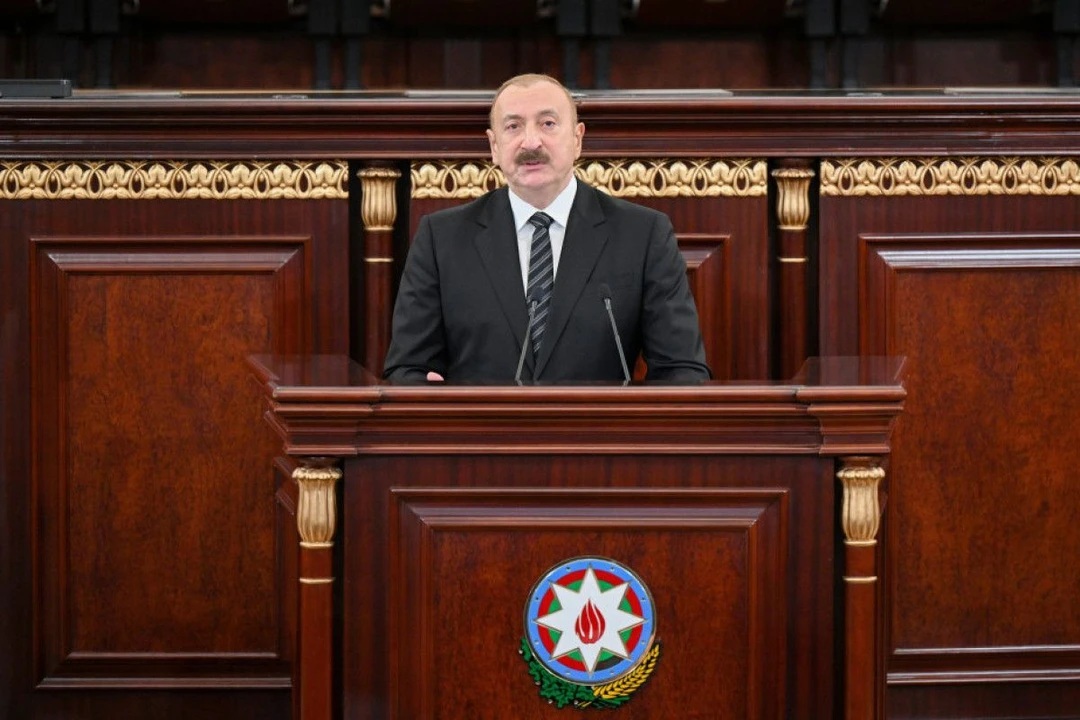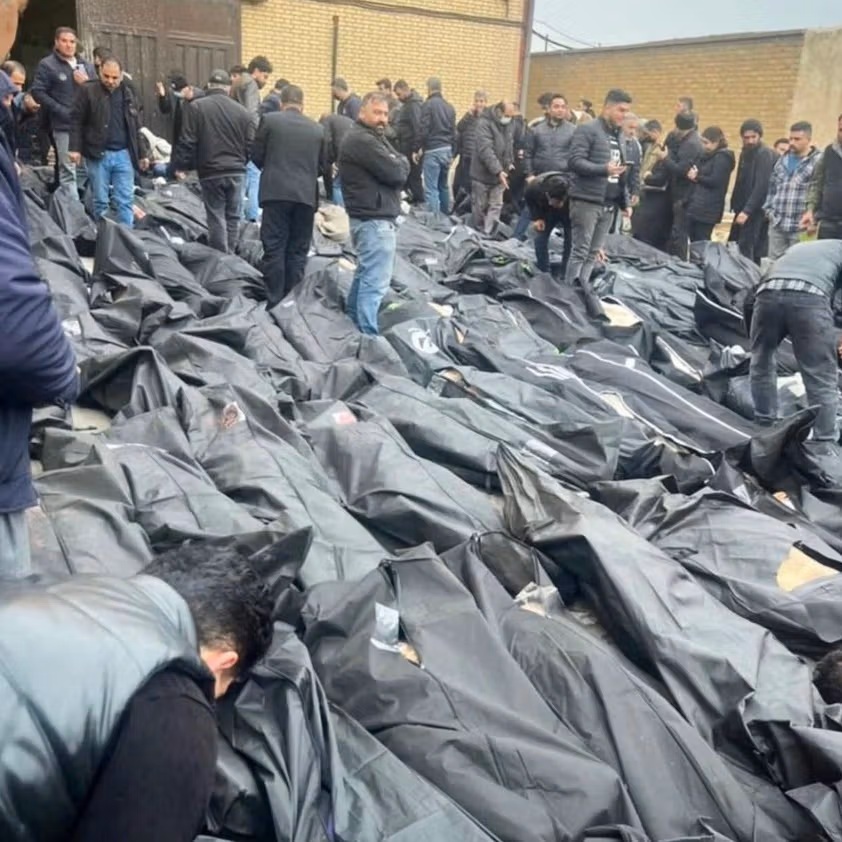
At the conference marking the 80th anniversary of the Azerbaijan National Academy of Sciences earlier this month, Azerbaijani President Ilham Aliyev addressed one of the most sensitive issues that remains unresolved between Armenia and Azerbaijan following the settlement of their longstanding conflict over the Karabakh region. He referred to the fate of approximately 300,000 Azerbaijanis who were deported from the present-day territory of Armenia in the late 1980s and early 1990s and who continue to await their return to their historical homelands.
By Vasif Huseynov
Rejecting accusations that Azerbaijan harbours intentions to invade Armenia or that the return of Azerbaijanis could lead to separatist tendencies, Aliyev stated:
“Azerbaijanis have never fallen victim to the disease of separatism. Our people have contributed to the statehood of the countries in which they live, and today, in no country do Azerbaijanis create – or will create – problems for any state or any other people. Therefore, the return of Azerbaijanis to present-day Armenia should not frighten the Armenian people or state.”
While his remarks caused a series of reactions in Armenia, where both the government and many people oppose the return of Azerbaijanis, the issue remains one of historical justice, and its resolution is essential for achieving lasting peace and reconciliation between the two nations.
Background
Today, no Azerbaijanis are residing within the internationally recognised borders of the Republic of Armenia. Yet, historically, these territories were home to a substantial Azerbaijani population.
The predominantly monoethnic composition of modern Armenia is the result of a long and systematic process of ethnic cleansing, forced deportations, and widespread violence against the Azerbaijani population – a process that spanned more than a century.
These actions were not isolated episodes but rather deliberate campaigns supported by successive Armenian authorities and, at times, influenced by broader regional and Soviet policies, all of which sought to uproot Azerbaijanis from their ancestral lands. The persecution and displacement of Azerbaijanis from the territories of present-day Armenia occurred in several major waves.
The first large-scale outbreaks of violence took place in 1905–1906 and again in 1918–1921, when Azerbaijani communities were targeted in massacres and forced expulsions amid the broader regional upheavals of the early twentieth century.
Another significant phase of deportations occurred between 1948 and 1953, when tens of thousands of Azerbaijanis were forcibly resettled to Azerbaijan under Joseph Stalin’s directives.
This period also coincided with the earlier administrative transfer of historically Azerbaijani-majority regions, including Zangezur, to Armenia in 1921—a move that further altered the ethnic composition of the area.
The final and most devastating wave took place between 1987 and 1991, during the dissolution of the Soviet Union. In these years, the Armenian Soviet Socialist Republic launched a campaign of violence and intimidation that led to the mass expulsion of approximately 300,000 Azerbaijanis from their homes. Entire villages were emptied, cultural and religious monuments destroyed, and centuries-old communities erased from the map.
This period marked one of the darkest chapters in Azerbaijani-Armenian relations, setting the stage for decades of mutual mistrust and animosity.
The legacy of the deportation of Azerbaijanis
In the early 1990s, after having completed the ethnic cleansing of Azerbaijanis from the territories of Armenia and the occupied Karabakh region of Azerbaijan, Armenia’s leaders were celebrating it as the realisation of longstanding racist and irredentist dreams. This is clearly expressed in a video recording leaked this year from a 1993 speech by then-Armenian President Levon Ter-Petrosyan, in a closed meeting with volunteer military groups.
In the video, Ter-Petrosyan is heard saying: “Armenia and Nagorno-Karabakh resolved a 600-year-old problem by completely cleansing the territory of other ethnicities (referring to Azerbaijanis). If there were still 170,000 representatives of other ethnicities in Armenia today, as there were until 1988, we would not have our state.” He further claimed that retaining regions such as Zangezur and others, where Azerbaijanis were the majority, would have been impossible without such measures.
The legacy of these events remains visible today. In the territories of modern Armenia, the material traces of Azerbaijani heritage – mosques, cemeteries, and other cultural landmarks – have been systematically destroyed, neglected, or replaced.
In contrast, place names of Azerbaijani origin have been altered. Moreover, the continued public glorification in Armenia of figures associated with these acts of ethnic cleansing reinforces a national narrative that justifies or downplays the suffering of the displaced Azerbaijani population.
This tragic historical legacy has contributed to a persistent sense of injustice and impunity in the region. It has also shaped Armenia’s political behaviour in the decades that followed, including its territorial claims and occupation of Azerbaijani lands after the collapse of the Soviet Union.
The right to return must be acknowledged for lasting peace.
Despite the international recognition of these injustices, the appeals of the Azerbaijani community deported from Armenia for justice and the right of return have largely gone unanswered.
Under international law, however, the right to return is a well-established principle. Article 13(2) of the Universal Declaration of Human Rights and Article 12(4) of the International Covenant on Civil and Political Rights affirm that no one shall be arbitrarily deprived of the right to return to their own country.
Similarly, the Fourth Geneva Convention prohibits forcible deportations and guarantees displaced persons the right to return to their homes in safety once hostilities cease. The UN Pinheiro Principles further reinforce the rights of displaced populations to restitution and return in dignity.
These norms underscore that the return of Azerbaijanis to their historical homelands is not only a moral imperative but also a legitimate right under international law.
On March 11, 2023, the Western Azerbaijani Community, a non-governmental organisation of the Azerbaijanis deported from Armenia, reached out to Armenian Prime Minister Nikol Pashinyan, urging him to engage sincerely in discussions to rectify the long-standing injustices inflicted upon displaced Azerbaijanis.
The letter sought to address the enduring suffering caused by these wrongs. The representatives of the Community made it clear that their desire to return to their homeland by no means is a plot against Armenia’s territorial integrity and sovereignty:
“To be clear, our demands for the peaceful return to our homes should not be misinterpreted or mispresented as being detrimental to the territorial integrity or sovereignty of Armenia. As the Government of Azerbaijan pledged and took actionable measures to ensure the rights of Armenian residents of the Karabakh region of Azerbaijan within its territorial integrity and sovereignty, the Government of Armenia must reciprocate by taking tangible steps to guarantee our rights.”
To the detriment of the efforts for peace and reconciliation between Armenia and Azerbaijan, the Armenian government did not respond to this letter and to the request of the Community for dialogue. Instead of responding to these calls for peaceful co-existence, the government of Armenia views the return of Azerbaijanis to Armenia as a threat. It disregards all the calls of the Western Azerbaijani Community.
This posture of the Armenian government undermines efforts to achieve lasting peace and security between the two countries. The demographic and cultural transformation of Armenia, achieved through systematic exclusion and displacement, continues to cast a long shadow over regional reconciliation.
Addressing this historical injustice is essential not only for the restoration of rights but also for building a durable peace between Armenia and Azerbaijan. The peaceful return of Azerbaijanis to their ancestral lands in present-day Armenia – under full respect for Armenia’s sovereignty and within its internationally recognised borders – would represent not only a triumph of historical justice but also a decisive step toward genuine coexistence.
As President Aliyev stated at the conference above, hundreds of thousands of Azerbaijanis are longing to return to their historical lands: not in tanks, but in cars.






